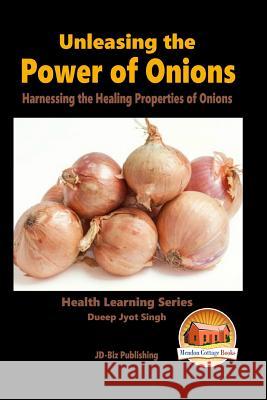Unleashing the Power of Onions - Harnessing the Healing Properties of Onions » książka
Unleashing the Power of Onions - Harnessing the Healing Properties of Onions
ISBN-13: 9781516996735 / Angielski / Miękka / 2015 / 64 str.
Table of Contents Introduction Types of Onions White Onions Red onions Pink/Yellow Onions Leafy Onions Onions for Nutrition Onions for Diabetics Onions for Stomach Problems Diarrhea and Cholera Preventative Onions to prevent Cholesterol buildup Onions for Urinary Infections Inflammation of Joints and Osteoarthritis Onions to Cure Depression Onions to cure Coughs and Colds Anti-aging benefits Of Onions Onion Juice to Remove Scars Onions for Sunstroke Onions as an Appetite Enhancer Traditional Onion Recipes Stuffed Onions Traditional Onion Soup How to Dry Onions Conclusion Author Bio Publisher Introduction I remember an Italian friend, who decided to cook a homemade meal for her hungry family, one leisurely weekend. All the ingredients for a delicious meal were right at hand. Suddenly I heard the song - she sang when she cooked - broken midway and abruptly. Where were the onions? All the herbs were there, and so were the spices. Garlic was also there in large quantities, but where were the onions? Imagine cuisines from all over the world which have not been flavored with members of the onion family like onions, garlic, leeks, and shallots. I can just understand how she felt, especially when a large multitude of people all over the world are not going to consider a meal complete, and less it is been accompanied with onions in some form or the other. There are 325 varieties of onions, found all over the world and it has been shown during archaeological surveys and through historical records that onions and mankind go together, just like bacon and eggs, salt-and-pepper and so on. You can eat onions raw, boiled, baked, cooked or in any way you wish. It is believed that onions supposedly originated in Western Asia, from where they spread all over the earth. Onions are one of the foods spoken of in the Holy Bible. In Egypt, workers on the pyramids were fed corn bread and onions, and so were the soldiers in Rome, who ate bread, onions and a fish sauce called garum, flavored with their daily ration of salt salarium was the money paid out to them so that they could buy salt.] Thus the term "salary" and the term of loyalty, coming down from the ages, "Eating someone's salt "which means having worked for them. In medieval Europe, rents were paid in onions and also bride gifts given during medieval weddings included onions and spices for those who could afford to give these preferred and desired gifts. It is a not so well-known fact that the onion is most powerful when it is plucked out fresh from the earth, and eaten within an hour. That is because it has a vital element, which remains only for an hour after the onion has been harvested. So when we were young, our grandmother always told us to go out in the garden and pull out a couple of fresh onion plants, to eat with our lunch. According to her, this would prevent us from suffering from sunstroke. It would also strengthen our immunity systems. It also kept our digestive system working excellently. After lunch, we were made to brush our teeth and gargle with salt water so that we did not go back to school, smelling of onion breath. It is a known historical fact that Gen. Grant demanded onions from the war Dept. during the American Civil War. According to him, his Army would not keep healthy, without onions, nor would it march without them The very next morning two wagon loads of onions were sent straight to him. According to him, onions kept his soldiers fit and prevented them from suffering from stomach problems. He was right, there. In ancient times, Egyptian priests and aristocrats took their oath of fealty to Pharaoh and country with an onion on their right palm. This can be seen in their wall paintings. According to Nero, it was the regular eating of onions which had cleared up his singing voice and made it sweet and melodious. But that did not prevent the populace and his soldiers, thoroughly bored with his homicida











